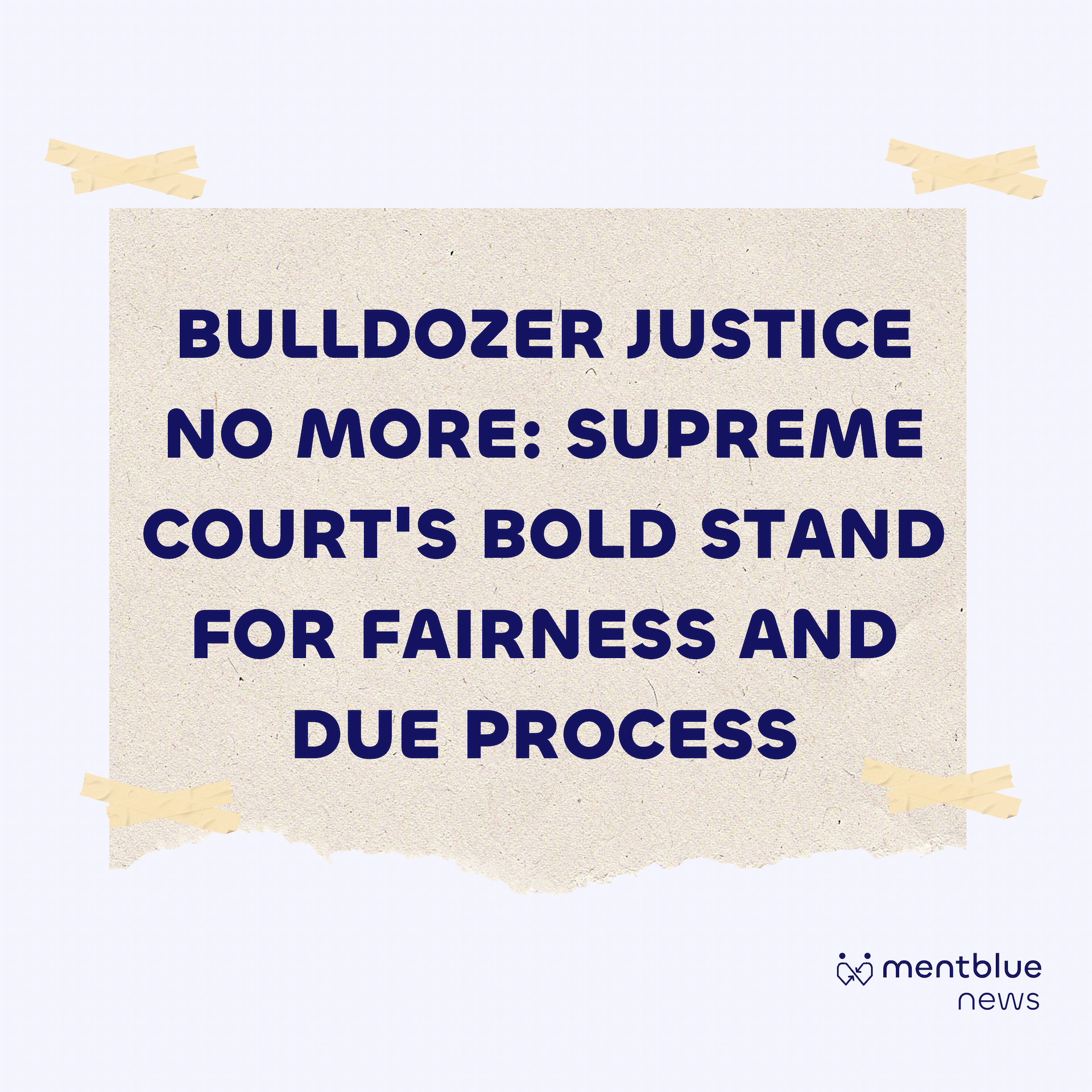Bench: Justice BR Gavai and Justice KV Viswanathan
The recent ruling by the Supreme Court of India on "bulldozer justice" marks a significant shift in the legal landscape regarding property demolitions linked to criminal accusations. This decision establishes clear guidelines aimed at curbing arbitrary demolitions that have been criticized as extrajudicial punishments.
𝗕𝗮𝗰𝗸𝗴𝗿𝗼𝘂𝗻𝗱 𝗼𝗳 "𝗕𝘂𝗹𝗹𝗱𝗼𝘇𝗲𝗿 𝗝𝘂𝘀𝘁𝗶𝗰𝗲"
The term "bulldozer justice" describes a controversial practice where state authorities demolish properties associated with individuals accused of crimes, often without due process. This trend has been prevalent in recent times, where such actions have been justified as targeting illegal constructions but have raised concerns about selective enforcement. Some argue that these demolitions disproportionately affect marginalized communities following incidents of unrest or protests.
𝗦𝘂𝗽𝗿𝗲𝗺𝗲 𝗖𝗼𝘂𝗿𝘁'𝘀 𝗥𝘂𝗹𝗶𝗻𝗴
In response to numerous petitions challenging this practice, the Supreme Court issued a strong rebuke against the use of bulldozers as instruments of punishment. The court emphasized that:
• Separation of Powers: The executive branch cannot assume judicial functions. Only the judiciary has the authority to determine guilt or innocence in criminal matters.
• Due Process: Demolitions cannot occur solely based on accusations; proper legal procedures must be followed. Affected individuals must receive a show cause notice detailing the reasons for demolition, allowing them time to contest the order.
• Accountability: Public officials who engage in unlawful demolitions will be held accountable, with potential financial repercussions for violations of these guidelines.
Justice BR Gavai highlighted that every family's home represents years of hard work and aspirations, asserting that arbitrary demolition violates fundamental rights protected under Articles 21 (right to life) and 300A (right to property) of the Constitution. "𝘐𝘵 𝘪𝘴 𝘢 𝘥𝘳𝘦𝘢𝘮 𝘰𝘧 𝘦𝘷𝘦𝘳𝘺 𝘱𝘦𝘳𝘴𝘰𝘯, 𝘦𝘷𝘦𝘳𝘺 𝘧𝘢𝘮𝘪𝘭𝘺 𝘵𝘰 𝘩𝘢𝘷𝘦 𝘢 𝘴𝘩𝘦𝘭𝘵𝘦𝘳 𝘢𝘣𝘰𝘷𝘦 𝘵𝘩𝘦𝘪𝘳 𝘩𝘦𝘢𝘥𝘴. 𝘈 𝘩𝘰𝘶𝘴𝘦 𝘪𝘴 𝘢𝘯 𝘦𝘮𝘣𝘰𝘥𝘪𝘮𝘦𝘯𝘵 𝘰𝘧 𝘵𝘩𝘦 𝘤𝘰𝘭𝘭𝘦𝘤𝘵𝘪𝘷𝘦 𝘩𝘰𝘱𝘦𝘴 𝘰𝘧 𝘢 𝘧𝘢𝘮𝘪𝘭𝘺 𝘰𝘳 𝘪𝘯𝘥𝘪𝘷𝘪𝘥𝘶𝘢𝘭𝘴' 𝘴𝘵𝘢𝘣𝘪𝘭𝘪𝘵𝘺 𝘢𝘯𝘥 𝘴𝘦𝘤𝘶𝘳𝘪𝘵𝘺. 𝘈𝘯 𝘪𝘮𝘱𝘰𝘳𝘵𝘢𝘯𝘵 𝘲𝘶𝘦𝘴𝘵𝘪𝘰𝘯 𝘢𝘴 𝘵𝘰 𝘸𝘩𝘦𝘵𝘩𝘦𝘳 𝘵𝘩𝘦 𝘦𝘹𝘦𝘤𝘶𝘵𝘪𝘷𝘦 𝘴𝘩𝘰𝘶𝘭𝘥 𝘣𝘦 𝘱𝘦𝘳𝘮𝘪𝘵𝘵𝘦𝘥 𝘵𝘰 𝘵𝘢𝘬𝘦 𝘢𝘸𝘢𝘺 𝘵𝘩𝘦 𝘴𝘩𝘦𝘭𝘵𝘦𝘳 𝘰𝘧 𝘢 𝘧𝘢𝘮𝘪𝘭𝘺 𝘰𝘳 𝘧𝘢𝘮𝘪𝘭𝘪𝘦𝘴 𝘢𝘴 𝘢 𝘮𝘦𝘢𝘴𝘶𝘳𝘦 𝘧𝘰𝘳 𝘪𝘯𝘧𝘭𝘪𝘤𝘵𝘪𝘰𝘯 𝘰𝘧 𝘱𝘦𝘯𝘢𝘭𝘵𝘺 𝘰𝘯 𝘢 𝘱𝘦𝘳𝘴𝘰𝘯 𝘸𝘩𝘰 𝘪𝘴 𝘢𝘤𝘤𝘶𝘴𝘦𝘥 𝘪𝘯 𝘢 𝘤𝘳𝘪𝘮𝘦 𝘶𝘯𝘥𝘦𝘳 𝘰𝘶𝘳 𝘤𝘰𝘯𝘴𝘵𝘪𝘵𝘶𝘵𝘪𝘰𝘯𝘢𝘭 𝘴𝘤𝘩𝘦𝘮𝘦 𝘰𝘳 𝘯𝘰𝘵 𝘢𝘳𝘪𝘴𝘦𝘴 𝘧𝘰𝘳 𝘤𝘰𝘯𝘴𝘪𝘥𝘦𝘳𝘢𝘵𝘪𝘰𝘯," the judgment said.
𝗞𝗲𝘆 𝗚𝘂𝗶𝗱𝗲𝗹𝗶𝗻𝗲𝘀 𝗘𝘀𝘁𝗮𝗯𝗹𝗶𝘀𝗵𝗲𝗱
The Supreme Court's ruling lays out specific procedural safeguards:
• Notice Requirement: Authorities must issue a 15-day notice before any demolition, allowing residents to respond or vacate.
• Documentation: The entire demolition process must be documented on film to ensure transparency and accountability.
• Judicial Oversight: Local authorities are required to establish digital means to track notices and final orders regarding demolitions.
• Restitution for Unlawful Demolitions: If demolitions are found to violate court orders, officials responsible may face restitution claims deducted from their salaries.
𝗜𝗺𝗽𝗹𝗶𝗰𝗮𝘁𝗶𝗼𝗻𝘀 𝗳𝗼𝗿 𝗗𝗲𝗺𝗼𝗰𝗿𝗮𝗰𝘆 𝗮𝗻𝗱 𝗥𝘂𝗹𝗲 𝗼𝗳 𝗟𝗮𝘄
This ruling reinforces the principles of democracy and the rule of law in India by ensuring that punitive actions against individuals are conducted fairly and transparently. It serves as a reminder that even in cases involving serious accusations, individuals retain rights that cannot be arbitrarily stripped away by state action.
The Supreme Court's intervention is seen as a crucial step towards preventing the misuse of power by state authorities and safeguarding civil liberties against extrajudicial measures. These guidelines aim to restore faith in legal processes and protect citizens from potential state overreach.
In conclusion, while the Supreme Court's guidelines represent a positive move towards curbing "bulldozer justice," effective implementation will be essential to ensure that these principles are upheld across all states in India.
#BulldozerJustice #SupremeCourt #Law #Legal #Crime #News #India
And check out each of mentblue offerings here:



